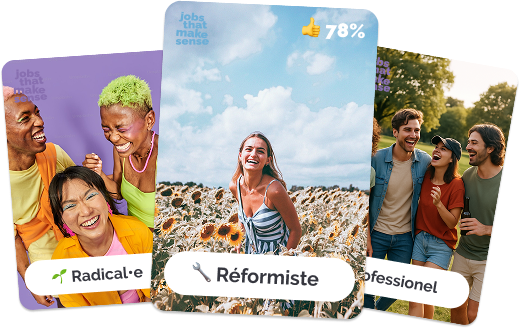Responsible Travel Times (RTT): An inspiring new HR practice
With the increasing importance of environmental and social issues, more and more companies are looking to integrate practices that reflect their values on a daily basis. "Responsible Travel Times" (RTT) fall within this movement by offering an innovative system: providing additional vacation days to employees who choose more environmentally friendly means of transportation for their personal travel, such as taking the train instead of a plane. This initiative helps align the environmental commitments of companies with the behavior of their employees. We have gathered testimonials from Claire Degueil, Chief People & Transformation Officer at Evaneos, and Enora Georgeault, Senior Sustainability Consultant at Axionable, to understand the impact and challenges of implementing RTT in their respective organizations.
Can you tell us about the origin of this initiative?
Claire Degueil (Evaneos): After COVID-19, Evaneos went through a period of questioning, having spent 2.5 years on partial unemployment. This pause prompted us to reassess our relationship with working time. At the same time, our "Better Trips" strategy, which aims for more sustainable tourism, was gaining more and more traction and resonated deeply with our employees. Our desire to make an impact was no longer limited to our traveling customers but extended to our local environment in France. During our first post-COVID seminar, we organized a solidarity day involving all our employees at an association in Paris, followed by a night train departure with 150 employees to the South of France. This experience marked the beginning of our solidarity and environmental RTTs, encouraging our employees to engage in associations and favor low-carbon travel.
Enora Georgeault (Axionable): At Axionable, the idea of RTT was born from a double inspiration: the creation of RTT at Ubiq and informal discussions among teams and management. A member of the management committee had even mentioned the idea without realizing it had already been implemented elsewhere. The enthusiasm of the teams motivated us to form a working group to study the feasibility of RTT at our company. After two to three brainstorming sessions on eligibility rules (minimum travel time, requirement for a complete round trip without a plane, etc.), we presented the project to the management committee, who approved it. Our approach was collaborative from the beginning, which facilitated smoother implementation.
What objectives did you have in mind when launching this initiative?
Claire Degueil (Evaneos): Our objectives were twofold: to promote responsible behaviors among our employees and to be consistent with what we advocate externally for our travelers. By highlighting practices such as low-carbon travel, we want to embed our environmental commitments into the daily lives of our employees. This aligns their experience within the company between what we say and what we do. Above all, it's a matter of credibility and coherence.
Enora Georgeault (Axionable): For us, the TTR aims to encourage a change in behavior regarding transportation and to reward those who are already engaged in this approach. We also wanted to create a competitive advantage to attract and retain talents sensitive to these issues. Offering 2 TTR days per person is also a militant approach for the company, actively engaging in the construction of a society with more responsible travel modes. Moreover, the TTR also offers an excellent opportunity to promote Axionable as a pioneering company in sustainable HR practices, which allows us to stand out in the market.
What were the main challenges in implementing this practice?
Claire Degueil (Evaneos): The complexity of the initial setup was our first challenge. We had a system where the company and the employee each contributed half to a RTT, twice a year, which was complicated in practice. We simplified by offering a full dedicated RTT (environmental or solidarity), to encourage the adoption of these days off. This recent change aims to remove the barriers to using these RTT and to better align our HR policy with the needs and expectations of employees.
Enora Georgeault (Axionable): At Axionable, the main challenge was defining the application modalities of the TTR. We took the time to formalize clear rules on eligibility criteria and the request process to avoid ambiguity. Involving different stakeholders, including employees who frequently use flights, allowed for a balanced and fair setup. However, a blind spot remains: employees who travel only locally cannot benefit from the TTR, which might create a sense of unfairness. We are therefore considering solutions to address this specific issue.
What impacts have you observed following the implementation of these initiatives?
Claire Degueil (Evaneos): The quantitative results are modest. However, they remain important to us. We have observed a strengthening of employee engagement, not only at hiring but also over time. The coherence between our corporate strategy and our internal practices motivates employees, retains them, and engages them in the long term. Additionally, these initiatives pave the way for other actions aligned with our decarbonization objectives, fostering a virtuous circle within the company.
Enora Georgeault (Axionable): After nine months of implementation, 30% of employees have benefited from a TTR, and at least 25% of these trips would initially have been made by plane. These figures show us that we are on the right track! However, some barriers remain, such as the higher cost of sustainable alternatives or personal logistical constraints, which limit the full adoption of TTR.
How did your teams react to these initiatives?
Claire Degueil (Evaneos): The initiative was very well received. One memorable anecdote is that of our CFO, who was the first to use an Environmental RTT to return from Barcelona by train after New Year's. This magnificent journey was a revelation for him to the point that he even decided to move with his family to Barcelona at the start of the school year and now takes this train once a month. This type of story shows how these initiatives can transform the professional and personal lives of employees.
Enora Georgeault (Axionable): The feedback from employees is extremely positive, we are very proud of this initiative! Those who have benefited from it are very grateful and also use this experience to raise awareness among those around them about the benefits of responsible travel. Some have experienced picturesque sunsets on journeys to Spain, Corsica, or Portugal, while others have had more unusual trips, like a night in a cabin with three children returning from Berlin!
What advice would you give to other organizations wishing to implement similar initiatives?
Claire Degueil (Evaneos): My main advice is to keep things simple. A device that is too complex quickly becomes a barrier, both for employees and HR. The key is to facilitate access to these devices and make the experience as smooth as possible to encourage wide adoption.
Enora Georgeault (Axionable): Involving employees from the start is essential. Building the system collectively ensures its appropriation and relevance. Also, consider integrating tracking tools to assess the real environmental impact, such as avoided CO2 emissions, and communicate these results regularly to reinforce engagement. Beware of greenwashing: these initiatives must be part of a comprehensive and coherent CSR policy to avoid criticism.
How do you see the evolution of these practices in your organization? Do you plan further similar actions in the future to strengthen your HR and CSR commitments?
Claire Degueil (Evaneos): We still have many ideas to strengthen our commitments, always in line with our decarbonization strategy. These initiatives are only a starting point, and we continue to explore new ways to support the engagement of our employees.
Enora Georgeault (Axionable): Responsible Travel Times are just the beginning. We are currently working on other initiatives, such as ecological and solidarity engagement leaves. We are convinced that these initiatives will continue to strengthen our corporate culture and position us as a responsible and attractive employer.
This joint interview highlights the multiple benefits of Responsible Travel Times: improved employee engagement, strengthened coherence between the company's values and its internal practices, and active contribution to sustainable societal change. So, convinced?






